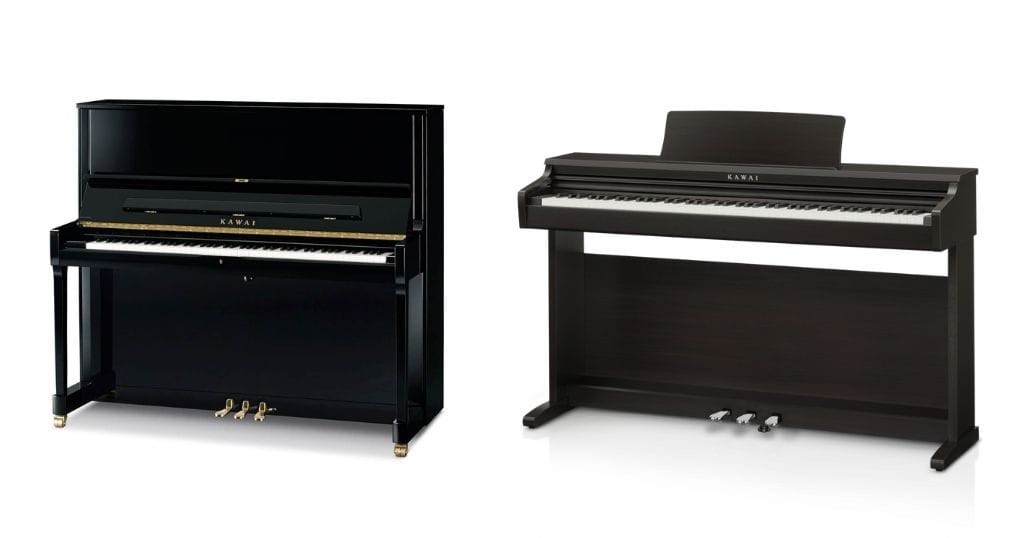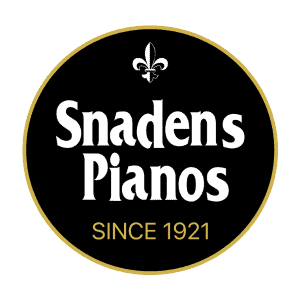
The main difference between a digital piano and an acoustic piano is the way they produce their sound. Acoustic pianos use a mechanical action where hammers strike strings to create each note’s sound, which is then amplified by the piano’s soundboard. On the other hand, digital pianos play back sampled sounds from an acoustic piano through their speakers or headphones, which are generated when the key triggers a sensor.
With advancements in technology, digital pianos (and in particular, hybrid pianos) are coming closer and closer to replicating acoustic pianos every year. Both have their advantages, but which one is right for you? In this guide, we’ll break down the key differences between digital and acoustic pianos to help you make an informed choice.
What is a Digital Piano?
A digital piano is an electronic keyboard instrument that replicates the sound of a traditional acoustic piano. It uses pre-recorded instrument samples and can be played through speakers or silently with headphones. They also have weighted keys (and in the case of Kawai digital pianos, a weighted hammer action) to emulate the feeling of playing an acoustic piano. Most digital pianos usually incorporate other features, including other piano and instrument sounds, recording function, metronome and more.
What is an Acoustic Piano?
An acoustic piano is the traditional version of the instrument that most people picture. They are mechanical instruments that make sound when hammers strike strings as the keys are pressed. The two main types of acoustic pianos are grand pianos and upright pianos. They each have their own differences in construction and sound production.
Learn More: What’s the Difference Between Grand Pianos and Upright Pianos?
Key Differences Between Digital Pianos and Acoustic Pianos
Sound Production & Quality
Acoustic pianos generate sound naturally through string vibrations, which are amplified by the soundboard. Each note has subtle tonal variations depending on touch and dynamics. This gives them a warm, nuanced tone. Digital pianos play back high-quality recordings of acoustic pianos for their sound. Advanced audio processing and resonance modelling are used to simulate the complexities of an acoustic piano’s sound. Despite this, some musicians still feel that the digital sound lacks the depth of a true acoustic experience.
Digital pianos also have the advantage of having a sound library that allows for the selection of various sounds. This library can include sound samples of electric and acoustic pianos, strings, harpsichords and more.
Maintenance & Tuning
Pianos are mechanical instruments, and parts wear out over time. No matter the quality, age or how often you play it, acoustic pianos need regular tuning and maintenance. It’s recommended that an acoustic piano be tuned and maintained at least once or twice a year to preserve its tonal integrity and keep it mechanically sound. The useful lifespan of a piano is generally between 20 to 40 years.
Learn More: The Importance of Piano Tuning & Maintenance
On the other hand, digital pianos do not require tuning. Some hybrid pianos (e.g., Kawai Novus pianos) require regulation of the action every few years, but as digital pianos have no strings, they do not require tuning like traditional acoustic pianos do. Many people play their digital pianos for 10+ years. However, like most digital products, the technology improves over time, and the new digital pianos are now more advanced than they were 10, 20 or 30 years ago.
Touch Sensitivity
Touch and feel are important factors for pianists. Acoustic pianos offer an authentic response thanks to their complex mechanical action, which includes weighted keys and graded hammer action. This gives players precise control over dynamics and articulation, allowing for expressive and nuanced playing.
Digital pianos try to emulate the feel of an acoustic piano’s keys using weighted keys, hammers and key detection sensors. There can still be subtle differences in how digital pianos respond to your touch compared to real acoustic pianos. However, some high-end digital models come close.
Portability
Digital pianos are often the more convenient option when it comes to moving your instrument. Many digital piano models are designed to provide an authentic piano playing experience in a lightweight, portable package. This makes them a great option if you need an instrument that is easy to transport for gigs and performances. Acoustic pianos, especially grand pianos, are much heavier and difficult to move, often requiring professional movers and careful handling.
Volume Control
Digital pianos offer precise volume control, allowing players to practice at a low volume or even use headphones for silent practice. This is very helpful if you live in an apartment or share a living space. It’s also perfect for those late-night practice sessions when you don’t want to disturb anyone. Some acoustic pianos have a practice pedal that makes the sound very soft and muted by placing a rail of felt between the strings and hammers. However, this practice/muffler pedal isn’t as effective or precise as the volume control of digital pianos.
Are digital pianos as good as acoustic pianos?
A digital piano is often preferred over very cheap and old second-hand pianos. However, many people prefer a new acoustic piano because of its sound quality. An acoustic piano may not always be practical for the space where it is required, so digital pianos and hybrid pianos offer a versatile alternative. What the digital piano lacks in sounds, it more than makes up for with features such as its instrument library, recording capability and volume control.
Need Help Choosing a Piano?
Both acoustic and digital pianos have their unique advantages, and the right choice depends on your individual playing needs. While acoustic pianos can provide a more authentic playing experience, digital pianos are a more convenient option for practice and potentially transport. Considering their advantages and disadvantages will help you select the best piano for you. Snadens Pianos offers a range of both digital and acoustic pianos. Visit our showroom and speak with one of our expert staff to help you choose the piano that best suits your needs.

